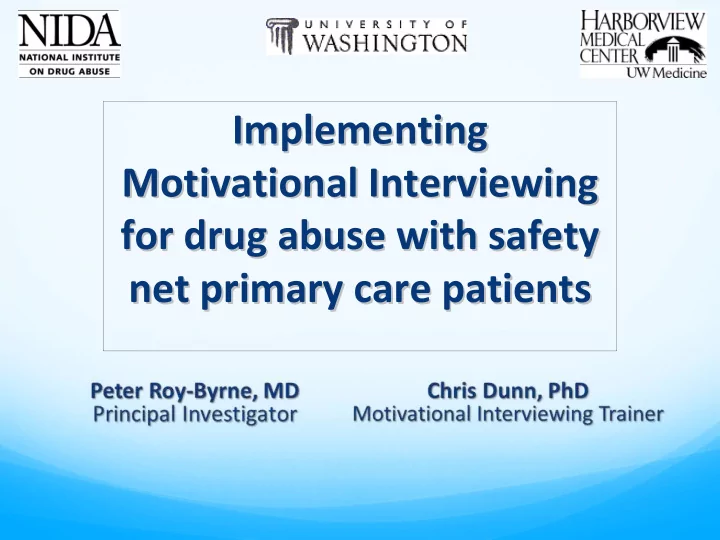

Implementing Implementing Motivational Interviewing Motivational Interviewing for drug abuse with safety for drug abuse with safety net primary care patients net primary care patients
TAU vs. MI Trained MSWs in primary care clinics 4 primary care clinics at Harborview, Seattle Few exclusion criteria, safety net population Screened, assessed & randomized in waiting room All BIs audio recorded!
NIDA trial of Brief Intervention for drugs in primary care Peter Roy ‐ Byrne MD Richard Ries MD, Co ‐ Investigator Antoinette Krupski PhD, Co ‐ Investigator Jutta Joesch, PhD, Co ‐ Investigator Dennis Donovan PhD, Co ‐ Investigator David Atkins, Consultant Kristin Bumgardner BS, Coordinator Grin Geiss Trusz BA, Co ‐ trainer Chris Dunn PhD, Co ‐ Investigator
Doses of Training and Supervision Initial Training Three 2 ‐ hour MI workshops 4 telephone practice sessions with actor + corrective feedback Supervision Monthly group supervision (1.5 hours) Bi ‐ monthly written feedback from trainer/supervisor
National dissemination by ACS & JCAHO: Implement SBIRT in all hospitals in U.S. SBIRT S creening for drug abuse among primary care patients B rief I ntervention (on the spot counseling for positive screens) R eferral for T reatment when appropriate
Potholes on the road to widespread dissemination STATUS QUO Identifying Skills Skills Training Managing Supervising Administration WIDESPREAD IMPLEMENTATION
3 Motivational I nterviewing Skills by MSWs in PC clinics
Examples of an open question and a reflection D: Before we dive into this discussion, give me an idea of how heroin fits into your life, so I can see it through your eyes . (OPEN QUESTION) P: I have to use every day, you know. You’ll have this kind of, like, uncomfortableness and cramping and once I score I feel much better. D: So you’re just trying to feel good; not be dope sick. (REFLECTION)
Example of HIGH MI SPIRIT D: What concrete steps could you take to make these changes? (AUTONOMY TO SOLVE OWN PROBLEMS) P: Steps I would like to take? I don’t know. D: Something positive, like what’s going to help you with your daughter or that craziness in your life? (DOESN’T TAKE EXPERT ROLE) P: You know, I don't know. Maybe I just . . . I just need to stay away from certain people. (CHANGE TALK EVOKED). So avoid certain people selling drugs or using drugs. That makes a lot of sense. (REFLECTION & SUPPORTIVE AFFIRMATION)
Examples of Low MI SPIRIT D: You need to quit drugs completely or you will never find housing or worK (TRIES TO INJECT CORRECT IDEAS) P: But there’s no way I can get off heroin until I have a safe place to live. Everybody around me uses… D: Unfortunately, housing authorities only accept people already clean from drugs. You cant have dirty UAs. (TAKES EXPERT ROLE OF AUTHORITY) P: See? That’s there’s the catch 22 again! I have to be clean to get housing but I cant get clean until I get housing. That’s discrimination! (NO CHANGE TALK EVOKED)
MI scores for 12 counselors on 3 MI skills Global Spirit rating (1-5) % Open Questions (0-100%) Reflection/Question ratio Competency Beginning Proficiency (Moyers 2007)
What we currently know about BI and MI MI probably enhances BI outcomes (Dunn, 2001) Some clinicians are not able or willing to learn to do MI well (Moyers, 2008)
What we do NOT know about BI and MI How good must MI skills be to reap significant change? How much MI training & supervision is enough? How much MI will social workers do for free?
Process outcomes reported today How many BIs can counselors actually do during routine care? How do our counselors’ MI skills compare to those in other studies of MI training? Did counselors’ MI skills improve, decline, or hold steady during the course of the study?
Group MI scores compared to other studies Study Training Global MI % of all questions Reflection/ Format Spirit (1 ‐ 5) that were OPEN Question (1 ‐ 100%) Ratio (SD) Baer WS only NA 41% (17%) 1.1 (0.5) 2003 Miller WS + CF 3.5 (1.3) 57% (16%) 1.4 (0.8) 2004 Moyers WS + CF 3.4 (0.84) 42% (18%) 1.2 (0.7) 2008 Roy ‐ Byrne WS + CF 4.5 (0.6) 38% (20%) 1.5 (0.96) 2011
MI scores for 12 counselors on 3 MI skills Global Spirit rating (1-5) % Open Questions (0-100%) Reflection/Question ratio Competency Beginning Proficiency (Moyers 2007)
12 4 8 Global MI Spirit over time 11 3 7 10 2 6 1 5 9
4 12 8 % Open Questions over time 11 3 7 10 2 6 1 5 9
12 4 8 Reflection/Question Ratio over time 3 11 7 10 2 6 5 1 9
Lessons Learned Providers in busy medical settings can learn to do MI Most counselors did not do very many BIs, nor very often MI skills mostly stable over time with monthly group supervision and bimonthly written feedback. Does high MI skill work better than low MI skill for drug abuse?
Stay tuned!
Recommend
More recommend